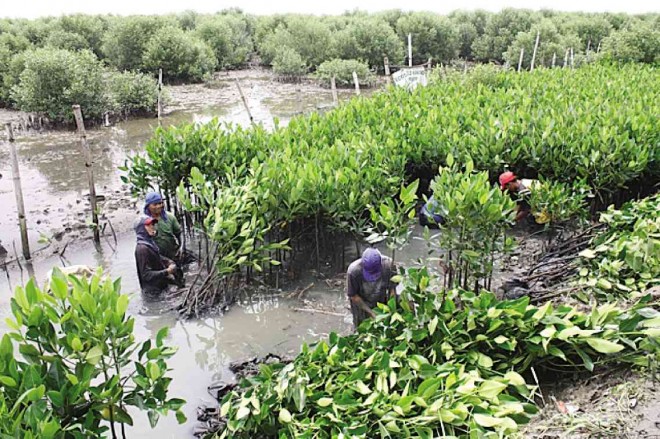
A LANDFILL developer, Ecoshield Development Corp. (EDC), has been nurturing mangroves that would line a sanitary landfill it is building in Bulacan province’s Obando town. The Court of Appeals allowed EDC to proceed with the work, junking an environmental complaint filed by Obando folk to stop the project. TONETTE OREJAS/INQUIRER CENTRAL LUZON
CITY OF SAN FERNANDO—Citing the need to revive a river in Bulacan province and to clean up Manila Bay, the Court of Appeals (CA) last month dismissed a petition of residents in Obando town to issue a writ of kalikasan and temporary environmental protection order against a sanitary landfill being built there.
The Supreme Court, on Feb. 21, 2012, issued a writ of kalikasan against the project and remanded the case to the CA for hearing, reception of evidence and rendition of judgment, as well as for the acceptance of the return of the writ.
But the CA’s former 10th Division, in its decision issued on Aug. 29, also denied the privilege of the writ of kalikasan that the high court issued two years ago.
Mercy Dolorito, one of the 16 petitioners, said she and other members of Concerned Citizens of Obando had yet to receive a copy of the decision. Ecoshield Development Corp. (EDC), the project proponent, furnished the Inquirer a copy.
“Contrary to the petitioners’ assertion, the establishment of the Obando sanitary landfill will significantly facilitate the cleanup of Manila Bay, in direct response to the SC’s continuing mandamus,” a part of the decision read.
Associate Justice Priscilla Baltazar-Padilla penned the decision that was concurred by Associate Justice Jose Reyes Jr., who chairs the division, and Associate Justice Agnes Reyes Carpio.
Obando residents sought the writ fearing that the landfill would damage the town’s mangrove ecosystem and worsen pollution and flooding there.
They were also outraged over the cutting of thick stands of mangroves near a barge docking area being built by EDC.
The Department of Environment and Natural Resources (DENR) failed to identify who was responsible for the cutting of mangroves. The EDC had blamed charcoal makers.
The EDC landfill sits on 44 hectares of company land in the coastal village of Salambao.
The landfill site, which faces Manila Bay, is a former fishpond area beside a mangrove forest. It is about a kilometer away from the nearest cluster of houses in the coastal village of Salambao.
Rafael Tecson, EDC vice president and general manager, said the landfill was almost complete as of August.
“Its features are safe for residents and the environment,” he said in a telephone interview on Saturday.
The CA relied on the testimony of Lormelyn Claudio, director of the DENR’s Environmental Management Bureau in Central Luzon, that the landfill would “accept only residual wastes for the secondary material recovery facility and no large-scale dumping of unprocessed garbage will be involved.”
This, she said, was stipulated by the environmental compliance certificate (ECC) that she issued for 10 ha of the EDC project.
The CA decision said a landfill in the Meycauayan-Marilao-Obando River System (MMORS) area “is clearly not enough to cater to all these wastes,” referring to the 1,500 tons produced by Bulacan and 1,600 tons from adjacent local governments.
The United States-based Blacksmith Institute ranked the MMORS the fifth dirtiest river system in a 2005 survey of 200 rivers all over the world, it said.
“The proposed sanitary landfill will be the final disposal point of the dredged materials for the implementation of a 10-year action plan on the desilting of the MMORS,” the decision said. “The sanitary landfill will, therefore, serve as Bulacan’s contribution to rehabilitate Manila Bay.”
The decision cited the commitments of EDC to provide a motorized boat to haul wastes collected within the MMORS, build a compartment for garbage and dredged materials from the MMORS, and construct a treatment plant that will remove hazardous coliform from the water.
The CA said it recognized the precautionary principle under the Rules of Procedure for Environmental Cases.
“[The] protection of the environment, through the putting up of a pollution control facility like a landfill, should not be postponed [as] there is a big threat to the environment due to illegal and indiscriminate dumping,” it said.
“It is time to give the project a chance to carry its commitment to resurrect this waterway and provide solution for proper garbage disposal,” the CA added.
It directed the project’s multipartite monitoring team to monitor the construction of the landfill and its operation as well as report on the compliance of EDC to the ECC.